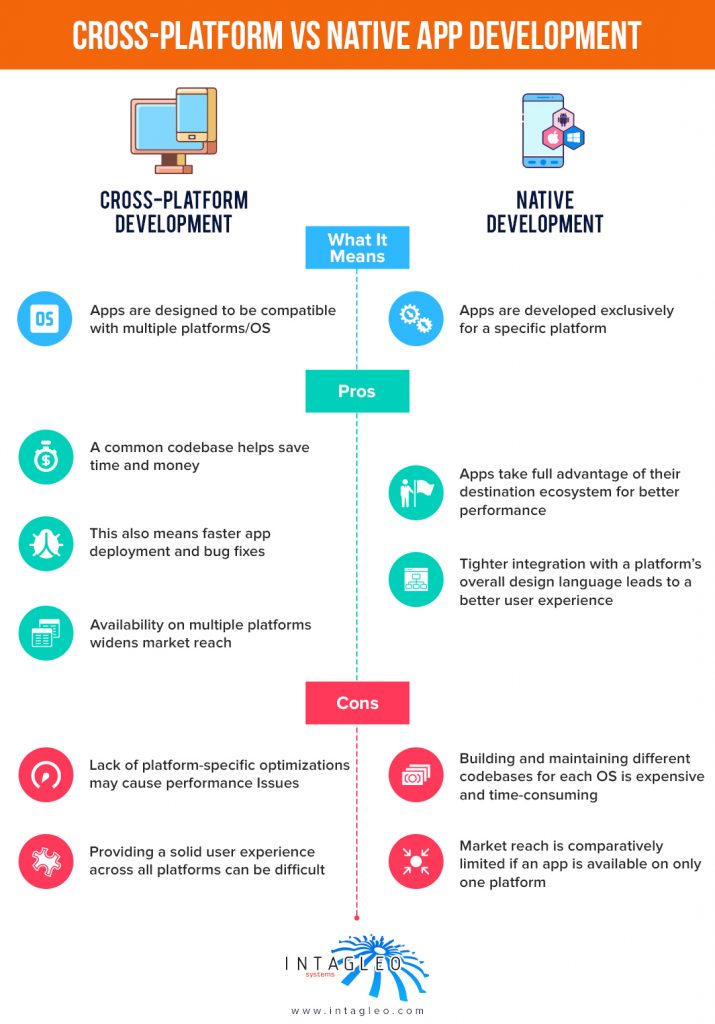The number of smartphone users in the world today is more than 3 billion and is expected to grow further by several hundred million in the next few years (FYI, the world population in 2019 is just a little shy of 8 billion).
With smartphone and mobile app usage showing no signs of slowing down, companies of all kinds are coming to realize how vital mobile apps can be for promoting their brand and reaching more customers.
Also, with device fragmentation considerably down compared to the past, only two platforms dominate the mobile scene (namely, Android and iOS). Therefore, businesses and app developers need to consider both or risk missing out on potential customers and revenues.
Consequently, whether to develop a Cross-platform application or to go Native is a dilemma faced by all businesses seeking to make headway in the mobile app market. Unfortunately, there’s no one-size-fits-all approach when it comes to choosing the right option for your unique needs.
Keeping this in mind, we’ve prepared this article to help you make an informed choice on how to go about your app development endeavors. We’ve identified some essential factors you need to consider as well as the pros and cons of each approach.
But first, let’s delve into what Cross-platform and Native App development actually are.
What is Cross-platform App Development?
This entails the development of apps designed to be compatible with multiple platforms/operating systems (iOS, Android, Windows, etc.). The apps’ codebase is written in intermediate programming languages like JavaScript, HTML, and CSS. The ‘web’ application is then wrapped and packaged inside a native container, which allows them to run on each platform as if they were a Native app for that platform. Cross-platform apps developed this way are also called Hybrid apps.
Alternatively, app development frameworks and SDKs like React Native, Xamarin.Forms, or Flutter let you translate the codebase into the native code of various operating systems. Like Hybrid app development, this approach also enables you to reuse your code when publishing to different platforms, albeit with much better performance and user experience closer to that of Native Apps.
What is Native App Development?
This refers to the development of apps exclusively for a specific platform. These apps are developed in languages that are compatible with their target OS (i.e., ‘Native-to-the-OS’ language). For example, it can be Java or Kotlin for Android and Swift and Objective-C for iOS. Leveraging these native languages, developers can access and make better use of the OS or device’s full feature set. As a result, Native apps tend to offer superior performance and user experience.
Essential Considerations for Choosing Between Cross-platform and Native
1. Budget
How much money you’re willing to spend on the development of your mobile app will largely determine the route you take. If you’re strapped for cash, Native app development wouldn’t really be ideal, especially if you want to target both iOS and Android.
2. Available Skills and Resources
You’ll also want to consider the resources and expertise you have at your disposal. If your team is well-versed in specific languages, tools, and frameworks, you can use that to your advantage. For example, if your team’s more comfortable with JavaScript and React Native, you might find it easier to set plans in motion if you go down the Cross-platform route. Otherwise, you’ll need to acquire talent and build dedicated teams.
3. Intended Audience and Market Reach
Most businesses will want to make their app(s) available to both iOS and Android so they can target users of both platforms. In this scenario, it will make more sense to opt for Cross-platform development as you’ll only need one team to develop and maintain your application. This is also possible with Native development, but you’ll need additional manpower, time, and money to deal with the challenges associated with each platform.
4. Time to Market
How quickly you need your app to be available for the masses will also have a significant bearing on your choice. Native app development tends to be rather time-consuming, and if you’re worried about your competitors beating you to the punch, Cross-platform is the way to go. While your app’s performance and UX may suffer as a result, you can always shift to Native later.
5. App Complexity
App complexity can depend on several factors ranging from the included frameworks, choice of back-end technologies, and availability of SDKs to heavy animations and highly intricate (and often platform-specific) integrations. For more complex projects, we recommend sticking with Native as it’ll save you from a whole lot of pain down the road.
Cross-platform App Development: Pros and Cons
1. Pro: Saves Time and Money
In Cross-platform development, a common codebase is leveraged to develop apps for multiple mobile platforms. This means a developer only has to write the code once and only change elements specific to each platform, instead of rewriting the entire code from scratch every time. As a result, this not only saves costs and time associated with development and deployment on subsequent platforms, but also those related to debugging and quality assurance.
2. Pro: Widens Market Reach
Cross-platform development also ensures improved visibility and allows businesses to reach a broader audience as their app will be hosted on multiple mobile platforms and their app stores (Apple App Store, Google Play Store, Microsoft Store, etc.). Tapping into a more extensive user base translates to more conversions and increased revenues.
3. Pro: Simplifies App Deployment and Maintenance
Given there’s no need to create different codebases for different platforms, apps can be deployed on various platforms much quicker. Changes to Cross-platform apps are also easier to bring into effect as these updates or patches don’t need to be implemented individually for each platform. This makes it easier for businesses to bring their innovative ideas and products to the market quickly before anyone else takes up their spot.
1. Con: Performance Issues
Since these apps are not optimized for a particular platform but instead designed to comply with the requirements of multiple ones, their performance often takes a hit. Bits of code that are not common with a platform’s native code may not play well with the latter. As a result, these apps don’t integrate as well with individual platforms as their Native counterparts and may not even be able to take full advantage of a platform’s unique features.
2. Con: Lacking UX
Every platform has distinct UI and UX elements that make it unique. Google and Apple have even put forth guidelines for developers so their apps may fit right in with the respective ecosystems. Moreover, the interface is also dependent on the framework used to develop these apps. Therefore, designing an app that delivers robust user experiences and works just as well on all platforms poses quite a challenge for developers.
Native App Development: Pros and Cons
1. Pro: Better Performance
Since Native apps are tailor-made for a particular platform, they can take full advantage of the software as well as the underlying hardware (USB input, microphone, accelerometer, etc.). These applications are not held down by the peculiarities of different operating systems, and even the languages and tools used to develop them are natively supported by the platform (i.e., The Android SDK is used to create apps for Android).
2. Pro: Better UX
Perhaps, the most apparent edge Native apps have over Cross-platform ones is their superior user experience. Developers adhere to specific guidelines provided by Google or Apple, ensuring the app’s user experience perfectly aligns with that of a particular ecosystem. Moreover, direct access to the platform’s APIs that allows Native apps to inherit UI elements from the OS for tighter integration with the overall design language. Consequently, users find these apps more intuitive and easy to grasp as they’re able to interact with them in a way that’s already familiar to them.
1. Con: Expensive and Time-consuming
Native apps have higher development and maintenance costs and can take significantly more time to develop than Cross-platform apps, especially if they’re to be featured on multiple platforms. Developers have to build and maintain them on different codebases for each operating system. Additionally, businesses may need to maintain dedicated teams for each platform. This translates to spending more time looking for platform-specific experts, who may prove more challenging to find and costly.
2. Con: Limited Market Reach
Native apps are only created with a particular platform in mind. As a result, businesses will not be able to reach users of another OS unless a separate Native app is designed for that platform. With the mobile OS market share almost evenly divided among iOS and Android in countries such as the US and UK, businesses stand to lose a significant number of potential users and revenue by developing exclusively for just one or the other.
Share this Infographic On Your Site
The Bottom Line!
Both Native and Cross-platform app development have their pros and cons. The route you decide to take will depend on your priorities, the resources at your disposal, and what you’re seeking to achieve through your app. If you need assistance determining which approach will work best for you or want to kickstart the development of your mobile app, contact us today for a free consultation session.
We at Intagleo have extensive experience in custom mobile app development and have devised all manner of Native, Cross-platform, Hybrid, and Web apps for a global clientele over the last 15 years.




One Response
Thanks for sharing this information